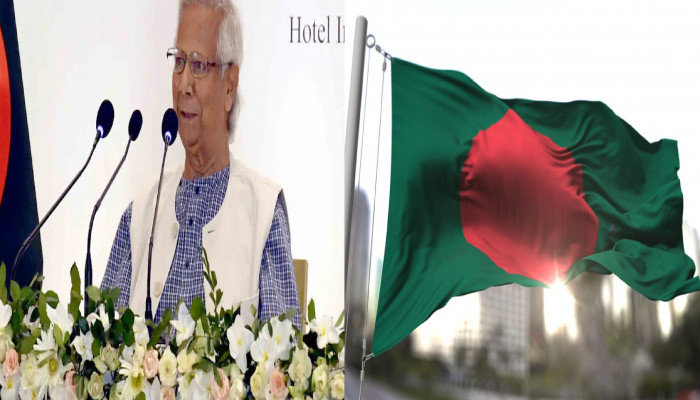Bangladesh interim government set to declare 'Proclamation of July Uprising'
- In Reports
- 04:18 PM, Dec 31, 2024
- Myind Staff
Bangladesh's interim government, led by Muhammad Yunus, has announced its decision to prepare a "Proclamation of July Uprising." This comes a day after it distanced itself from a proposed declaration with the same title by the Anti-Discrimination Students Movement, which sparked unrest four months ago.
At a midnight press conference, Shafiqul Alam, the press secretary of Muhammad Yunus, the main adviser of the interim government of Bangladesh, told reporters, "We hope within a few days the proclamation will be prepared with the participation and consensus of all and presented before the nation." Speaking to reporters outside Yunus' official Jamuna residence, Alam stated that the declaration would reflect the opinions of all involved, including students, political parties, and stakeholders like the Anti-Discrimination Students Movement, which played a key role in removing Prime Minister Sheikh Hasina's Awami League government on August 5.
Alam explained that the government proposed the charter to strengthen unity among the people, uphold the anti-fascist spirit, and support the call for state reform that emerged from the July uprising. Two days ago, the Anti-Discrimination Students Movement, along with the National Citizens Committee, a student-led group, announced that they would declare the proclamation of the July uprising on Tuesday afternoon at Dhaka's Central Shaheed Minar. However, after the government's midnight announcement, the student groups quickly held an emergency meeting. About two hours later, they informed the media that instead of making the proclamation, they would hold a “march for unity” at the same time and place. At a news conference on December 29, Hasnat Abdullah, the platform's convener, stated, "The Mujibist '72 constitution will be buried (in the proclamation) in the very place where the one-point declaration was made during the July uprising."
“Indian aggression was initiated through the principles of the 1972 constitution (and) the proclamation will make it clear how the Mujibist constitution destroyed the aspirations of the people and exactly how we want to replace it,” Abdullah said then. The platform leader stated that it was anticipated that the declaration would also deem the deposed premier's "Nazi Awami League" in Bangladesh "irrelevant." "We believe the way our revolution was embraced by all anti-fascists; this proclamation will also contain everyone's hopes and aspirations," said Sarjis Alam, the leader of the Anti-Discrimination Students Movement and the principal organiser of the National Citizens' Committee, during the same news conference.
The 1972 Constitution of Bangladesh was created a year after the country's independence. It was drafted by representatives elected in the 1970 elections, who served as members of the "Constituent Assembly" based on their "mandate." The Awami League, led by Sheikh Mujibur Rahman, secured an overwhelming majority in the elections, winning 160 out of 162 general seats and all seven women's seats in then-East Pakistan. However, Pakistan's military regime under General Yahya Khan launched a sudden army crackdown, which eventually led to the Liberation War. Yunus' press secretary stated that "the government has nothing to do with it" and "wants to see it (proclamation) as 'private initiative,'" demonstrating the apparent disassociation of the interim government from the "proclamation."
The 1972 Constitution of Bangladesh was created a year after the country's independence. It was drafted by representatives elected in the 1970 elections, who served as members of the "Constituent Assembly" based on their "mandate." The Awami League, led by Sheikh Mujibur Rahman, secured an overwhelming majority in the elections, winning 160 out of 162 general seats and all seven women's seats in then-East Pakistan. However, Pakistan's military regime under General Yahya Khan launched a sudden army crackdown, which eventually led to the Liberation War. “As your seniors, we feel disappointed when you (Student Movement leaders) say the constitution should be buried. If there is anything bad in the constitution, it can be amended,” he told reporters. Abbas said, “When you (student leaders) say things like this, it sounds fascist” as fascists used to say, ‘we will bury them, kill them, and cut them off". The defeated regime is frequently referred to as "fascist" by the students' platform and many political parties, notably the BNP.







Comments